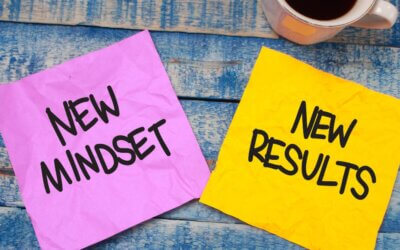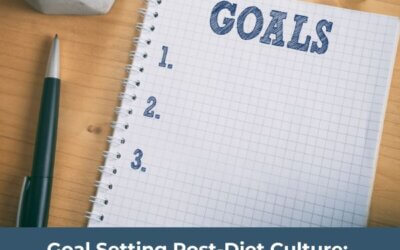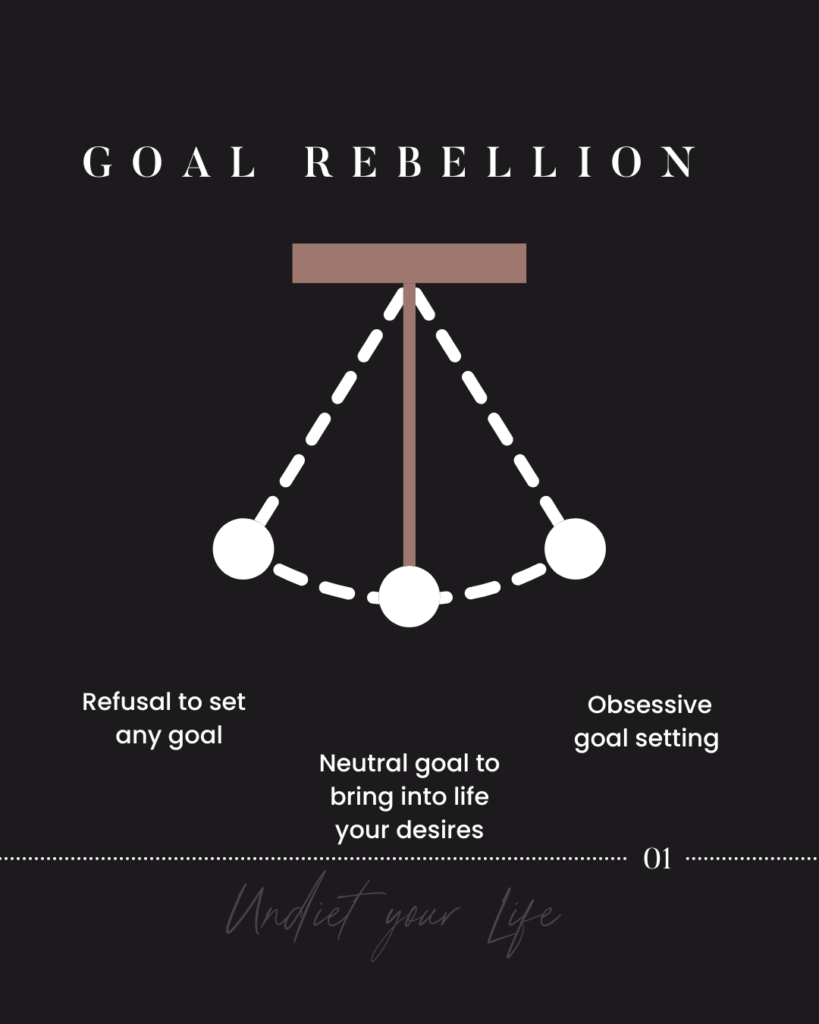Mindset Blogs
10 Tips for Silencing the Weight Loss Message During the Holidays
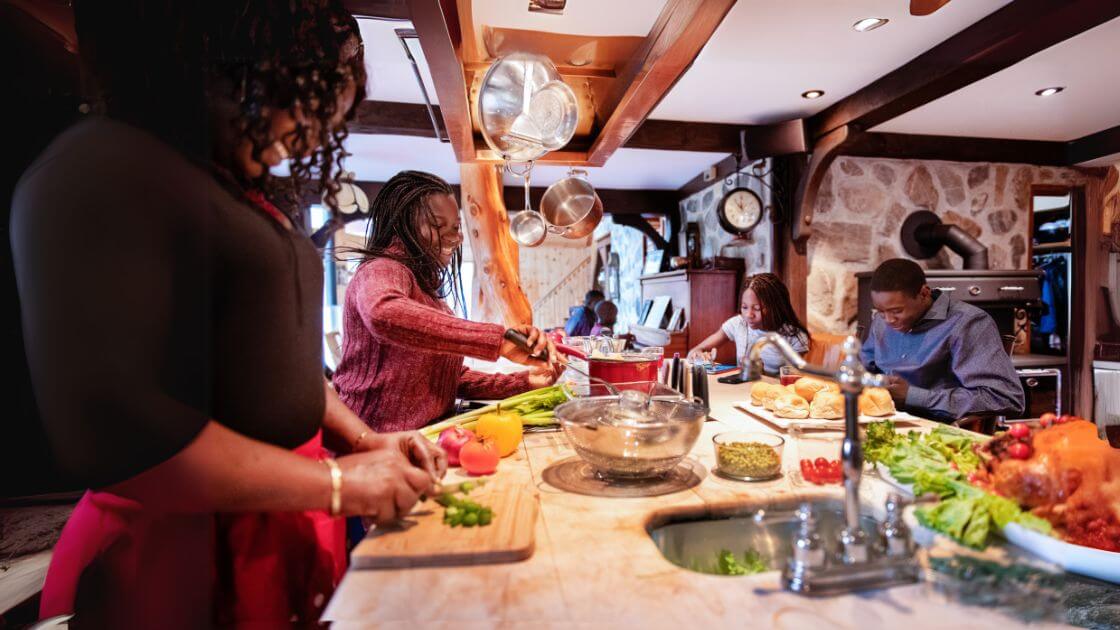

The holidays should be a time of joy, connection, and celebration, but for many, it’s also when the weight loss industry ramps up its messaging. From detox ads to fitness challenges disguised as New Year’s resolutions, these messages can overshadow the true spirit of the season, leaving you feeling unworthy or pressured to conform.
But you don’t have to listen. Silencing the weight loss message is about reclaiming your holiday experience and prioritizing your mental and emotional well-being over the noise of diet culture.
Here are 10 empowering tips to help you navigate the holidays while tuning out harmful weight loss messages.
1. Anticipate and Prepare for Weight Loss Messaging
Weight loss ads and campaigns flood the holiday season. From social media posts to commercials, these messages are everywhere, aiming to profit from your insecurities.
Tip: Anticipate this surge and decide how to respond. Mute accounts, skip triggering conversations, or prepare mantras like, “This message doesn’t define me.”
2. Understand the Systemic Fear of Fatness
The weight loss industry thrives on the fear of fatness, a belief ingrained in us by societal norms. Recognizing this fear as a learned bias is the first step toward dismantling its power.
Tip: Reflect on how societal pressures have shaped your views about weight and body image. Acknowledge that these fears are not your fault.
3. Follow the Money Trail
The weight loss, beauty, and wellness industries profit billions annually by pushing these messages. Remember, they aren’t invested in your health or happiness—they’re invested in their bottom line.
Tip: When you see a weight loss ad, remind yourself it’s designed to sell, not serve. This awareness can help you detach from its emotional impact.
4. Acknowledge Fatphobia as a Systemic Issue
Fatphobia isn’t just a personal issue—it’s systemic. It’s woven into media, healthcare, and social norms, perpetuating the belief that thinner is better.
Tip: Educate yourself on systemic fatphobia. Understanding its roots can empower you to resist its influence in your own life.
5. Learn the Language of Diet Culture
Silencing the weight loss message requires understanding the broader system of diet culture. This culture places value on thinness, equating it with health and morality, and keeps people preoccupied with their bodies.
Tip: Dive into resources that define and challenge diet culture. Learning its patterns can help you recognize and reject its influence.
Rather listen to the audio version of this blog? We’ve got you…
6. Be Compassionate with Yourself
It’s natural to feel the urge to lose weight in a world obsessed with thinness. However, acting on these feelings isn’t necessary.
Tip: Practice self-compassion. Acknowledge these feelings without judgment and remind yourself that your worth is not tied to your weight.
7. Curate Your Social Media Feed
The messages you surround yourself with matter. Social media can be a source of empowerment or a breeding ground for comparison and insecurity.
Tip: Unfollow accounts that promote weight loss or unrealistic beauty standards. Instead, follow creators who celebrate body diversity and self-acceptance.
8. Remember: You Don’t Owe Anyone an Explanation
Your body and choices are yours alone. You’re not obligated to explain your appearance, eating habits, or health goals to anyone.
Tip: Use affirmations like, “My body, my rules,” to reinforce your autonomy. Let go of the need to please others with your personal decisions.
9. Set Intentions from a Place of Love
When setting goals or intentions for the New Year, let them come from a place of love and self-respect, not fear or self-criticism.
Tip: Ask yourself, “What would I pursue if I believed I was already enough?” Use this as your guiding principle for decision-making.
10. Use Triggers as Opportunities for Growth
Avoiding weight loss messaging entirely isn’t realistic, but you can use these moments as chances to reflect and heal.
Tip: When triggered, pause and ask yourself, “What belief is being challenged here?” Use the experience to identify areas where you can grow and strengthen your mindset.
Silencing the Weight Loss Message: The Path to True Freedom
Silencing the weight loss message during the holidays isn’t just about avoiding negativity—it’s about embracing joy, connection, and self-worth. By following these tips, you can create a season that prioritizes your well-being over societal pressures.
Remember, the holidays are a time to celebrate the fullness of life, not shrink yourself to fit someone else’s ideals. This year, tune out the noise, choose self-love, and reclaim the holiday season for what it truly is: a time to cherish yourself and your loved ones.
Need help silencing the weight loss message to break free from diet culture?
You can access all of our services on our work with us page. We have a number of programs and service levels enabling us to serve most women:
Free Resources and Masterclasses: Get started and get to know us better!
Private coaching with Stephanie and her team Stephanie and her team of Certified Non-Diet Coaches are waiting to support you in a one-to-one setting with an individualized plan.
Non-Diet Coaching Certification for professionals ready to integrate the Going Beyond The Food Method™️ in their practice and for women wanting to become Certified Coach and build a business coaching other women beyond the food.
Why You Shouldn’t “Indulge” During the Holiday: ‘tis the season to smash down diet culture


The holiday season is a time of celebration, reflection, and joy. Yet, for many, it also comes laden with the weight of diet culture and its insidious grip. From the portrayal of women in holiday movies to societal expectations about indulgence and self-restraint, the season has long been entwined with patriarchal systems and diet culture narratives. This article explores the roots of these traditions and offers strategies to reclaim your holiday experience, diet-culture free.
The Patriarchal Roots of the Holidays
The modern holiday season is a blend of ancient traditions, Christianity, and consumerism. Initially tied to winter solstice celebrations, the holidays were historically about community and feasting. As Christianity gained prominence, religious elements merged with these practices. By the 19th century, Christmas had become a commercial enterprise, shifting focus from spirituality to consumption.
Patriarchy has played a key role in shaping holiday norms. From the gendered division of labor in holiday preparations to the expectation that women must create perfect celebrations, patriarchal systems have normalized the emotional and physical labor of the season for women. This dynamic also extends to diet culture, a tool of patriarchy that keeps women focused on controlling their bodies rather than asserting their power.
How Diet Culture Thrives During the Holidays
Diet culture is particularly potent during the holidays, exploiting themes of indulgence, guilt, and control. The narrative often goes like this:
- Indulge now, restrict later: The idea of holiday feasting is weaponized with the promise of New Year’s resolutions to “atone” for excess.
- Moralizing food choices: Phrases like “cheat day” or “being good” reinforce the idea that eating certain foods determines personal value.
- Pressure to prepare for the New Year: The “New Year, New You” rhetoric capitalizes on holiday guilt, selling solutions to problems diet culture itself created.
These narratives are everywhere—in movies, ads, and even casual conversations. Women’s magazines and online content emphasize self-restraint, while men’s content often highlights pleasure and relaxation, reflecting a stark double standard.
Rather listen to the audio version of this blog? We’ve got you…
How Patriarchy Shapes Holiday Diet Culture
The portrayal of women in holiday culture often reinforces diet culture and patriarchal norms. Consider these examples:
- Holiday Movies: Women are typically shown as self-sacrificing, managing endless holiday tasks while maintaining a “perfect” appearance. Their worth is tied to how well they fulfill these roles.
- Body Image in Media: Holiday visuals are dominated by thin, conventionally attractive characters, perpetuating unrealistic beauty standards.
- Food Messaging: Women are encouraged to “indulge” cautiously, while men are rarely subjected to such scrutiny.
These dynamics keep women in cycles of striving, guilt, and self-denial, making it harder to break free from these oppressive systems.
Breaking Free: How to Navigate the Holidays Diet-Culture Free
Awareness is the first step to change. Here’s how to navigate the season free from the constraints of diet culture:
1. Redefine Indulgence
The word “indulge” is often loaded with guilt and moral judgment. Instead, embrace the idea that food is a source of nourishment and joy. Remind yourself that no food is inherently “bad” or “good.” All foods fit into a balanced, intuitive approach to eating.
Action Step: Replace “I’m indulging” with “I’m enjoying.” Focus on the experience of savoring food without attaching guilt to it.
2. Shift the Focus from Food to Connection
The holidays are about more than what’s on the table. Reframe your celebrations to prioritize connection, relaxation, and reflection over food and appearance.
Action Step: Plan activities that emphasize bonding, such as games, outdoor walks, or sharing gratitude with loved ones.
3. Challenge Media Messages
Be critical of the holiday media you consume. Notice how women and men are portrayed differently and question the messages you’re absorbing.
Action Step: Discuss these observations with friends or family to raise awareness about these patterns. For example, point out gendered stereotypes in holiday movies during family movie nights.
4. Say No to “New Year, New You” Pressure
The New Year often brings a surge of dieting ads and fitness challenges. Reject the idea that your worth is tied to transforming your body.
Action Step: Set intentions that prioritize self-care and joy over physical appearance. For example, focus on learning a new skill or dedicating time to a hobby.
5. Reclaim Your Holiday Traditions
Patriarchy and diet culture have long dictated what the holidays “should” look like. It’s time to redefine these traditions on your terms.
Action Step:
- Simplify holiday tasks. Let go of unnecessary obligations that drain your energy.
- Celebrate in ways that feel authentic to you, whether that means skipping the turkey or enjoying a favorite family dish without guilt.
Cultivating Awareness and Passing It On: How to Navigate the Holidays Diet-Culture Free
Breaking free from diet culture during the holidays is not just an act of self-care but also a way to challenge systemic oppression. By refusing to participate in these harmful narratives, you pave the way for others—especially children—to experience the holidays without internalized shame or guilt.
When you model an intuitive, guilt-free approach to food and traditions, you contribute to a cultural shift that prioritizes well-being over unrealistic ideals.
Final Thoughts: A Season of Liberation
Navigating the holidays without diet culture is a radical act of self-love and resistance. By understanding the roots of holiday traditions and recognizing the systems at play, you can reclaim the joy and meaning of the season.
Let this be the year you celebrate on your terms—free from guilt, restriction, and the weight of oppressive narratives. Because the true spirit of the holidays lies in connection, love, and the freedom to be unapologetically yourself.
Want to Learn More How to Navigate the Holidays Diet-Culture-Free?
You can access all of our services on our work with us page. We have a number of programs and service levels enabling us to serve most women:
Free Resources and Masterclasses: Get started and get to know us better!
Private coaching with Stephanie and her team Stephanie and her team of Certified Non-Diet Coaches are waiting to support you in a one-to-one setting with an individualized plan.
Non-Diet Coaching Certification for professionals ready to integrate the Going Beyond The Food Method™️ in their practice and for women wanting to become Certified Coach and build a business coaching other women beyond the food.
Navigating Diet Talks and Comments about Weight & Body


A Guide for Women
In a world preoccupied with appearance and weight, navigating diet culture and unsolicited body commentary can be challenging. Many women face these conversations in social, family, and professional settings, making it essential to develop strategies to maintain self-confidence and emotional well-being. This guide offers insights into understanding diet culture, managing emotional triggers, and setting boundaries to foster empowerment.
Understanding the Context of Diet Talks and Body Comments
The Pervasiveness of Diet Culture
Diet culture is a societal framework that equates thinness with health, morality, and success. This narrative often influences conversations about weight, food, and bodies, leaving many unaware of its insidious effects. Women, particularly, are often targeted, expected to conform to unrealistic body standards shaped by patriarchal norms.
Recognizing the systemic nature of diet culture can help shift perspectives. The comments you hear or the comparisons you make are products of a deeply ingrained belief system, not personal truths.
Rather listen to the audio version of this blog? We’ve got you…
Preparing for Diet and Body Discussions
Anticipate the Conversations
Diet-related discussions tend to surface during holidays, family gatherings, and even casual meet-ups. Rather than being caught off guard, anticipate these topics and prepare mentally. Understand that people may not have the same awareness of diet culture as you do, and many speak from a place of conformity rather than intent to harm.
Mindset Shift: View these interactions as predictable events rather than personal attacks. This reframing can lessen their emotional impact.
Managing Emotional Reactions to Body Comments
Recognizing the Source of Your Emotions
Emotional responses to body-related comments often stem from internalized beliefs rather than the words themselves. For instance, a remark about weight gain might trigger self-doubt because it aligns with existing insecurities. However, these emotions are self-generated by how we interpret others’ words.
Actionable Step: Pause when faced with triggering comments. Ask yourself, “What belief am I holding onto that makes this comment hurtful?” This reflection redirects focus to your own empowerment.
Cultivating Compassion for Yourself and Others
For Yourself
Acknowledge that reacting emotionally to body commentary is a conditioned response shaped by years of exposure to diet culture. Practice self-compassion by reminding yourself that these feelings are normal but can be reprogrammed over time.
intentional Thought: “I am more than my body. My worth is not defined by societal standards.”
For Others
Understand that those engaging in diet talk or commenting on bodies often operate from their own insecurities and limited understanding. Extend compassion, knowing they might not yet realize the harm of their words.
Establishing and Maintaining Boundaries
Internal Boundaries
Internal boundaries involve controlling your reactions and emotions. When encountering diet talk, remind yourself that these opinions are not reflections of your value. Mentally disengage from conversations that don’t align with your beliefs.
External Boundaries
External boundaries require clear communication. Examples include:
- “I prefer not to discuss my body or weight.”
- “Let’s talk about something other than dieting or weight loss.”
- “I am focusing on a healthy relationship with food, and diet culture doesn’t align with that.”
If a conversation continues to infringe upon your comfort, physically remove yourself from the situation when possible.
Reprogramming Internal Beliefs for Long-Term Resilience
The Role of Self-Coaching
Self-coaching is a powerful tool to reshape the beliefs ingrained by diet culture. Start by identifying thoughts that no longer serve you. For example:
- Replace “I need to lose weight to be healthy” with “Health is about habits, not size.”
- Replace “She looks better than me” with “We all have unique bodies that serve us differently.”
Practicing these shifts regularly can rewire thought patterns, reducing the impact of external comments.
Practical Steps for Everyday Situations
- Create Intentional Thoughts: Before attending gatherings, prepare affirming thoughts. For instance:
- “Comments about my body reflect their beliefs, not my worth.”
- “My body is not a topic of public discussion.”
- Develop a Go-To Response: Having a polite yet firm reply ready can defuse awkward moments. For example:
- “Thank you for your concern, but I’m focusing on a holistic approach to my health.”
- Engage in Supportive Communities: Surround yourself with people who respect and celebrate bodies of all shapes and sizes. Online groups or in-person communities can offer encouragement and validation.
The Power of Compassionate Boundaries
Setting boundaries isn’t about controlling others; it’s about protecting your energy and emotional well-being. While some may find this assertiveness surprising, over time, it fosters healthier relationships where mutual respect is prioritized.
Remember: Setting boundaries is a form of self-respect and empowerment.
Final Thoughts: Taking Responsibility for Your Journey
Ultimately, the power to navigate diet talks and body comments lies within. You cannot change others, but you can control how you respond. By shifting your beliefs, preparing for interactions, and setting compassionate boundaries, you reclaim your narrative and define your worth independently of societal standards.
As you embark on this journey, be patient and kind to yourself. Transforming your mindset takes time, but the freedom it brings is invaluable. You are more than your body. Embrace the full, authentic version of yourself.
Ready to Explore this Further?
You can access all of our services on our work with us page. We have a number of programs and service levels enabling us to serve most women:
Free Resources and Masterclasses: Get started and get to know us better!
Private coaching with Stephanie and her team Stephanie and her team of Certified Non-Diet Coaches are waiting to support you in a one-to-one setting with an individualized plan.
Non-Diet Coaching Certification for professionals ready to integrate the Going Beyond The Food Method™️ in their practice and for women wanting to become Certified Coach and build a business coaching other women beyond the food.
Weight Neutral Health Motivation: How to Create Motivation When You Feel Unmotivated
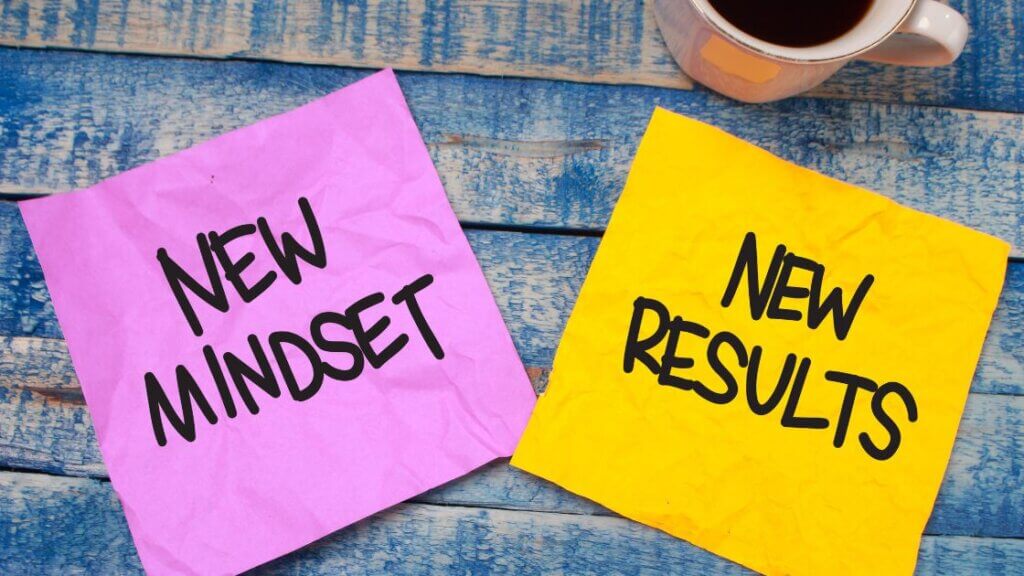

Redefining Motivation: A Weight-Neutral Approach to Personal Growth
Have you ever found yourself stuck, feeling completely unmotivated and unable to move forward? As a weight-neutral health coach, I’ve worked with countless clients who struggle with motivation across various aspects of their lives. Today, I’m sharing a transformative perspective that can help you break free from motivational paralysis.
The Biggest Misconception About Motivation
Most people believe motivation is something that happens to you—that you’re either naturally motivated or you’re not. This couldn’t be further from the truth. Motivation is an emotion, just like joy, anger, or pleasure. It’s not a mysterious force that randomly appears; it’s a state you actively create through your thoughts and perceptions.
Why We Sabotage Our Own Motivation
Interestingly, what we perceive as a lack of motivation is often a sophisticated self-protection mechanism. When we feel unmotivated, we’re typically:
– Avoiding perceived danger
– Protecting ourselves from potential failure
– Responding to deep-seated fears of judgment or criticism
Weight-Neutral Health Coaching Motivation: Uncovering the Roots of Unmotivation
Let me share a recent coaching experience that illustrates this perfectly. I worked with a client struggling to submit an important assignment. On the surface, it looked like procrastination. But when we dug deeper, we discovered her real challenge: paralyzing fear of failure.
Redefining Failure: A Powerful Mindset Shift
Her family history had taught her that anything less than being in the top 10% was considered a failure—with punishment attached. As an adult, she was still operating from this limiting belief. Together, we reframed failure as something entirely different: an opportunity to learn and grow.
How to Create Motivation: A Step-by-Step Approach
Creating genuine motivation requires honest self-reflection. Here’s my proven strategy:
1. Identify Your Thoughts: Grab a pen and paper. Write down your genuine thoughts about the area where you’re struggling with motivation.
2. Challenge Your Beliefs: For each thought, ask yourself:
– Is this an absolute fact?
– Where did this belief come from?
– Is there another way to interpret this situation?
3. Redefine Your Narrative: Create a new, empowering definition that removes the emotional charge of “failure” or “not good enough.”
Rather watch the video version of this blog? Check out Stephanie’s Instagram live here.
Weight-Neutral Health Coaching Motivation: Real-World Motivation Transformation
In my client’s case, redefining failure from a catastrophic event to a learning opportunity completely changed her approach. Suddenly, submitting the assignment became exciting rather than terrifying.
Your Motivation Toolkit
– Recognize motivation as an emotion you control
– Challenge your existing beliefs
– Create a compassionate, growth-oriented narrative
– View challenges as opportunities for learning
The Courage to Change Your Perspective
Creating motivation takes genuine courage. It means confronting uncomfortable thoughts and choosing a different path. But the reward is immense: you’ll unlock potential you never knew you had.
Final Thoughts
Motivation isn’t something that happens to you—it’s something you create. By understanding your thoughts, challenging your beliefs, and reframing your experiences, you can generate motivation in any area of your life.
Remember, you have the power to shift your perspective and create the motivation you desire.
Need Help with Creating Motivation?
You can access all of our services on our work with us page. We have a number of programs and service levels enabling us to serve most women:
Free Resources and Masterclasses: Get started and get to know us better!
Private coaching with Stephanie and her team Stephanie and her team of Certified Non-Diet Coaches are waiting to support you in a one-to-one setting with an individualized plan.
Non-Diet Coaching Certification for professionals ready to integrate the Going Beyond The Food Method™️ in their practice and for women wanting to become Certified Coach and build a business coaching other women beyond the food.
Healthism: The Desire to Be Healthy Gone Wrong
Healthism: A Guide for Women
Health is undeniably important for overall well-being, but when the pursuit of health takes on an obsessive, moral, or judgmental tone, it can transform into something more harmful than helpful—this is what we call healthism. Especially for women, the pressure to embody an ideal of perfect health often becomes entangled with societal expectations, personal worth, and even consumer culture. This guide aims to unpack healthism, its impact, and how to recognize when your desire to be healthy has crossed a line.
What is Healthism?
Healthism is a belief system that places disproportionate value on individual health and views it as the ultimate measure of personal worth. In essence, it equates being healthy with being virtuous. Much like diet culture, which idealizes thinness, healthism idealizes optimal health and often disregards the societal, environmental, and genetic factors that influence it.
Key tenets of healthism include:
- Health is entirely within individual control.
- Health is a moral obligation.
- Those who are healthy are perceived as superior to those who are not.
While prioritizing health seems positive on the surface, the ideology of healthism ignores the nuances of health, such as its natural fluctuations and the myriad external influences that are beyond personal control. For women, this is compounded by societal pressures to “do it all”—to be the ideal partner, parent, and professional while also being flawlessly healthy.
How Healthism Manifests in Women’s Lives
The societal push for women to prioritize health often begins with subtle messaging, such as:
- Ads promoting “clean eating” or “wellness routines.”
- Social media influencers showcasing unattainable standards of health.
- Advice framing health behaviors as moral choices (e.g., “good” vs. “bad” foods).
Over time, these messages can lead to unhealthy behaviors disguised as wellness, including:
- Over-reliance on supplements or detoxes: Women may feel compelled to spend exorbitantly on wellness products that promise perfection.
- Perfectionism in diet and exercise: Strict regimens with no room for flexibility can result in burnout or disordered eating patterns.
- Judging self-worth by health status: Women may feel inadequate or guilty for experiencing normal health fluctuations like menopause or illness.
For example, a woman going through menopause might believe her symptoms signify a failure to prepare her body adequately. This not only stigmatizes natural health transitions but also fosters feelings of guilt and inadequacy.
Rather listen the audio version of this blog? We’ve got you…
We also have a version of this podcast for health professional
The Link Between Healthism and Self-Worth
One of the most damaging aspects of healthism is how it ties health to self-worth. Many women internalize the belief that they must be healthy to be valuable. This can manifest as:
1. Internalized Shame: Feeling “less than” because of perceived health shortcomings.
2. Constant Anxiety: Obsessing over health choices and fearing judgment from others.
3. Never-Ending Pursuit: Chasing an ideal of health that is both unrealistic and ever-changing.
This fixation often leads to a cycle of striving and failure. When health is positioned as a moral responsibility, any deviation can feel like a personal shortcoming, triggering a fight-or-flight response to “regain” worth.
Recognizing Problematic Patterns in Your Health Journey
How can you tell if your pursuit of health has become problematic? Reflect on the following questions:
1. Do you feel guilty when you deviate from your health routine?
2. Are you spending excessive time or money chasing health ideals?
3. Do you tie your self-worth to your ability to follow strict health rules?
4. Are you ignoring external factors (like genetics, stress, or life circumstances) in your assessment of your health?
5. Do you delay happiness or self-acceptance until you achieve “perfect health”?
If you find yourself answering “yes” to many of these questions, it may be time to reassess your relationship with health.
Shifting Perspectives: A Balanced Approach to Health
Recognizing and addressing healthism requires a shift in mindset. Here are some steps to cultivate a healthier relationship with health:
1. Acknowledge Health as a Spectrum
Health is not binary—it is not something you either “have” or “lack.” It is a dynamic and multifaceted aspect of life that fluctuates due to factors both within and beyond your control.
2. Separate Health from Self-Worth
Your worth as a person is not determined by your health status. Practice self-compassion and recognize that being human involves imperfections, including health challenges.
3. Reclaim Autonomy in Health Choices
Shift from “I have to” to “I choose to.” Decide which health practices genuinely enhance your life rather than adhering to rigid rules imposed by societal pressures.
4. Challenge the Narrative of Personal Responsibility
Understand that you control only a small portion of the factors influencing your health. Research shows that external determinants like socioeconomic status, environment, and genetics play a far more significant role than individual choices.
5. Focus on Enjoyment, Not Obligation
Instead of forcing yourself into a strict health regime, explore activities and foods you genuinely enjoy. This reframes health as a source of pleasure rather than pressure.
Moving Forward: The Bright Side of Wanting to Be Healthy
When approached from a place of self-love rather than fear or obligation, the pursuit of health can be empowering. By redefining health as a personal, flexible, and nonjudgmental practice, women can liberate themselves from the oppressive grip of healthism.
Imagine exercising not because you feel you must, but because your body craves movement. Or choosing foods based on satisfaction and nourishment rather than societal labels of “good” or “bad.” This shift fosters a sense of autonomy and well-being without the weight of perfectionism.
Final Thoughts: Liberating Yourself from Healthism
Healthism may present itself as a pursuit of wellness, but its darker side often brings stress, guilt, and dissatisfaction. For women, disentangling self-worth from health is not just a personal journey but also an act of defiance against societal norms that impose unattainable standards.
By recognizing the signs of healthism and adopting a balanced approach to health, you can reclaim your time, energy, and joy. Remember, your value is not determined by your health status—you are inherently worthy, just as you are.
Want to learn more about redefining health and cultivating self-compassion?
You can access all of our services on our work with us page. We have a number of programs and service levels enabling us to serve most women:
Free Resources and Masterclasses: Get started and get to know us better!
Private coaching with Stephanie and her team Stephanie and her team of Certified Non-Diet Coaches are waiting to support you in a one-to-one setting with an individualized plan.
Non-Diet Coaching Certification for professionals ready to integrate the Going Beyond The Food Method™️ in their practice and for women wanting to become Certified Coach and build a business coaching other women beyond the food.
3 Lessons From 10 Years of Non-Diet Goal Setting
This 3-part blog series is designed to help people make peace with setting personal development goals post-diet culture. This is part 3 of 3. Read Part 2 & Part 1 here.
__________________
3 Lessons From 10 Years of Non-Diet Goal Setting
Have you noticed how every January, we’re bombarded with messages about transforming ourselves? Here’s a radical thought: you don’t have to set any New Year’s resolutions at all.
You are enough exactly as you are right now. Diet culture and hustle culture have conditioned us to believe we constantly need to do more and be more. But that stops today.
If You Choose to Set Goals: My 3 Essential Tips
Before sharing my decade-long journey, let me offer three crucial tips for those who do choose to set goals. Remember, this choice should come from a place of empowerment, not obligation.
1. Perfect Achievement Isn’t the Point
The real purpose of setting a goal isn’t to achieve it flawlessly. Instead, focus on:
- Building consistent, imperfect habits aligned with your vision
- Shifting your beliefs about yourself and what’s possible
- Developing an identity as someone who takes regular action
- Understanding that small, imperfect steps create sustainable change
2. Unlearning Old Goal-Setting Patterns
Society has taught us that goals are about deprivation until achievement. This mindset needs unlearning:
- Release the belief that you can’t feel good until you reach your goal
- Challenge the idea that imperfect action equals failure
- Let go of the “all-or-nothing” mentality
- Recognize that the journey is as valuable as the destination
3. Feel Good While Pursuing Your Goals
The key to sustainable change is feeling better now, not later:
- Create positive experiences during the pursuit of your goal
- Release the need for willpower and self-discipline
- Focus on actions that feel good and align with your values
- Remember that self-love creates better results than self-criticism
My Journey to Freedom: A Timeline of Transformation
After spending 20 years trying to “fix” myself, I discovered something life-changing: we don’t need fixing. Here’s how this revelation transformed my entire approach to personal growth:
- 2011: Employment Freedom – Breaking free from the 9-to-5 by starting my own business
- 2014: Food Freedom – Discovering intuitive eating and trusting my body’s wisdom
- 2016: Body Freedom – Embracing body neutrality and unlearning harmful beauty standards
- 2018: Health Freedom – Expanding health beyond physical metrics
- 2020: Exercise Freedom – Finding joy in movement instead of punishment
- Present Day: Financial Freedom – Building wealth with an abundance mindset
3 Lessons From 10 Years of Non-Diet Goal Setting
1. The Power of Constraint
Setting multiple goals simultaneously isn’t a sign of ambition – it’s often a recipe for overwhelm. Limiting yourself to one meaningful goal is a powerful act of self-love because:
- Your brain can focus its resources effectively
- Small, consistent steps add up faster than scattered efforts
- You can fully integrate changes before adding new challenges
2. Clear Goals Create Natural Motivation
The secret to sustainable motivation isn’t willpower or discipline. It’s setting goals free from emotional baggage:
- Define success clearly and objectively
- Remove moral weight from your goals
- Track progress without judgment
- Celebrate small wins consistently
3. Court Your Goals Like a Partnership
Transform your relationship with goals from a battle to a partnership through:
- Regular check-ins and adjustments
- Compassionate self-talk
- Flexible adaptation as you learn
- Building self-trust through small promises kept
3 Lessons From 10 Years of Non-Diet Goal Setting: Common Challenges and Solutions
- All-or-Nothing Thinking
- Practice the “1% better” approach
- Focus on progress, not perfection
- Loss of Motivation
- Build systems rather than relying on willpower
- Create environmental changes that support your goals
- Fear of Failure
- Redefine failure as valuable data
- Use setbacks as learning opportunities
3 Lessons From 10 Years of Non-Diet Goal Setting: Practical Implementation Steps
- Start With a Goal Audit
- Is this goal truly yours?
- Does pursuing it energize you?
- Can you maintain self-respect while pursuing it?
- Create a Supportive Environment
- Curate your social media mindfully
- Surround yourself with supportive people
- Set up your space for success
3 Lessons From 10 Years of Non-Diet Goal Setting: Moving Forward with Compassion
Whether you choose to set goals or not, make your decision from a place of self-respect. Remember: Love is always the best choice. You can’t hate yourself into sustainable change.
Ready to Transform Your Relationship with Goals?
You can access all of our services on our work with us page. We have a number of programs and service levels enabling us to serve most women:
Free Resources and Masterclasses: Get started and get to know us better!
Private coaching with Stephanie and her team Stephanie and her team of Certified Non-Diet Coaches are waiting to support you in a one-to-one setting with an individualized plan.
Non-Diet Coaching Certification for professionals ready to integrate the Going Beyond The Food Method™️ in their practice and for women wanting to become Certified Coach and build a business coaching other women beyond the food.
This post is Part 3 of a 3-part blog series designed to help people make peace with setting personal development goals post-diet culture. Read Part 2 & Part 1 here.
Clean Vs Dirty Goals: The Key To Creating Achievable Goals Post-Diet Culture
This 3-part blog series is designed to help people make peace with setting personal development goals post-diet culture. This is part 2 of 3. Read Part 1 & Part 3 here.
_________________
Clean Vs Dirty Goals: The Key to Creating Achievable Goals Post-Diet Culture
For many women emerging from the diet culture mindset, goal-setting feels challenging, especially around the New Year when diet culture messaging resurfaces. Often, the struggle stems from years of setting “dirty goals”—those rooted in societal expectations rather than personal fulfillment. This post (part two of a three-part series) explores the difference between clean and dirty goals and guides you in setting achievable, non-diet culture goals.
Achievable Goals Post-Diet Culture: What Are Dirty Goals?
Dirty goals, which often emerge from diet culture, are goals tied to external validation or conditional happiness. These goals make our self-worth dependent on achieving a certain look, number, or outcome. Diet culture teaches us that achieving such goals will make us worthy, happy, or confident, but in reality, they create a continuous cycle of self-judgment. This approach often leaves us feeling like failures if we don’t meet these “perfect” standards, making goal-setting feel heavy rather than empowering.
Achievable Goals Post-Diet Culture: The Foundation of Clean Goals
Clean goals, on the other hand, are rooted in personal growth and internal motivation. Instead of focusing on an outcome that “fixes” something we believe is wrong with us, clean goals focus on the journey itself. They empower us to feel worthy and confident as we work toward them—not just if or when we achieve them. In other words, they are achievable goals post-diet culture.
Characteristics of Dirty Goals and How to Avoid Them
Dirty goals are subtle yet pervasive in the post-diet mindset. Recognizing their characteristics can help in shifting to clean goal-setting.
1. Abstract and Vague Goals
Dirty Goal: “I want to feel more confident.”
Clean Alternative: Create a specific and actionable goal, such as “I’ll practice speaking up once in meetings this month to build confidence.”
Dirty goals lack clear metrics, making progress hard to measure. Clean goals should be specific and measurable, helping you recognize small wins that build self-trust and encourage sustainable growth.
2. Conditional Happiness
Dirty Goal: “I’ll feel safe and confident when I reach a certain weight.”
Clean Alternative: Focus on feeling confident through affirmations, self-care routines, and body neutrality practices now, not later.
When we tie our happiness to reaching a goal, it keeps self-worth on hold. Clean goals help us feel confident and worthy in the present, ensuring self-acceptance becomes part of the journey.
3. All-or-Nothing Thinking
Dirty Goal: “Starting January, I’ll go to the gym every day.”
Clean Alternative: Set a realistic baseline, such as exercising once a week, and gradually increase as you build a sustainable habit.
Dirty goals often set high expectations, making it easy to quit after missing a single target. Clean goals, however, recognize progress over perfection, allowing flexibility and resilience as you work toward them.
4. Fantasizing About a ‘Perfect’ Outcome
Dirty Goal: “Losing weight will attract the right partner.”
Clean Alternative: Cultivate healthy relationships through self-acceptance and open-mindedness, rather than relying on a specific outcome.
When goals hinge on an idealized future, it’s easy to feel unfulfilled if that vision doesn’t materialize. Clean goals encourage progress and enjoyment in the now, creating fulfillment through self-acceptance rather than an imagined “perfect” life.
Setting Clean, Achievable Goals Post-Diet Culture
Once you understand the pitfalls of dirty goals, you can use these tips to create clean goals that align with your true desires and personal growth.
1. Focus on the Process, Not Just the Outcome
Diet culture often pushes goals that revolve around a fixed result. Clean goals are rooted in the process of growth. By valuing the journey over the destination, clean goals allow for flexibility and adaptability. Rather than “I must achieve this by March,” think “I’m excited to explore this new habit and see where it takes me.”
2. Celebrate Small Wins
Dirty goals frequently have us aiming high without celebrating our progress along the way. This can lead to burnout and discouragement. Clean goals embrace incremental progress. Take time to celebrate every small step—each is a sign of commitment to your journey. These small wins are valuable milestones that reinforce your dedication to a healthier relationship with yourself.
3. Trust the Journey
Clean goal-setting reminds us that achieving our dreams doesn’t require certainty. Trusting the journey means allowing ourselves to be open to all outcomes, viewing each as a learning experience. When setbacks happen, as they inevitably will, we don’t let them derail us. Instead, we understand that progress isn’t always linear and that resilience grows through every experience.
Dirty Goals in Disguise: Red Flags to Watch For
Even with the best intentions, dirty goals can sometimes sneak back in, especially during times of stress. Here are a few red flags to watch for:
– Seeking Validation from Others: If the excitement of sharing your goal with others overshadows the goal itself, it may be more about external approval than personal growth.
– Feeling Overwhelmed by the ‘Fantasy’ of the Goal: If the planning process for a goal gives you a dopamine rush but quickly leads to feeling overwhelmed, this is a sign the goal may be too complicated or unrealistic.
By identifying these patterns, you can realign your intentions with clean goal-setting principles, ensuring that your goals reflect your values and desires rather than societal expectations.
Achievable Goals Post-Diet Culture: Practical Steps to Set Clean Goals
If you’re ready to create clean, achievable goals post-diet culture, start by breaking down your goal-setting process into smaller steps:
1. Write Down Your Goal and Motivation: Be clear about why this goal matters to you. Make sure the reason is genuinely yours, not shaped by external influences.
2. Create a Realistic Action Plan: Choose one small, achievable step to take. For example, if you want to feel healthier, start with gentle movement or a morning stretch routine.
3. Check-In Regularly: Schedule time to review your progress and adjust if necessary. Goal-setting is an evolving process, not a one-time commitment.
4. Celebrate Effort, Not Just Results: Acknowledge your effort each step of the way, rather than waiting until the final milestone to reward yourself.
Moving Forward with Clean Goals
In a world saturated with diet culture messaging, shifting from dirty to clean goals is a powerful way to reclaim self-worth. When we set clean goals, we remove the pressure to be “fixed” or “improved.” Instead, we celebrate who we are right now while embracing the journey of personal growth.
As you explore these new approaches to goal-setting, remember that true fulfillment doesn’t require you to meet specific standards. By focusing on goals that honor your inherent worth, you’re choosing a path that nourishes both your body and your soul—free from diet culture’s influence.
Conclusion
Transitioning from diet-culture-driven goals to clean, achievable goals post-diet culture isn’t an overnight shift. But with awareness and a commitment to self-compassion, you’ll find that the goals you set for yourself can lead to sustainable, fulfilling progress. Whether you’re aiming to develop new habits, grow in confidence, or simply live with more intention, clean goals help you get there without sacrificing your well-being.
By reframing goals and moving away from diet culture’s influence, you’re not only creating a healthier mindset—you’re choosing a life that celebrates you, just as you are.
Ready to Set Clean Goals? We Can Help You!
You can access all of our services on our work with us page. We have a number of programs and service levels enabling us to serve most women:
Free Resources and Masterclasses: Get started and get to know us better!
Private coaching with Stephanie and her team Stephanie and her team of Certified Non-Diet Coaches are waiting to support you in a one-to-one setting with an individualized plan.
Non-Diet Coaching Certification for professionals ready to integrate the Going Beyond The Food Method™️ in their practice and for women wanting to become Certified Coach and build a business coaching other women beyond the food.
This post is part 2 of our 3-part series on making peace with goal setting in your post-diet culture journey. Access Part 1 & Part 3 here.
Goal Rebellion Post-Diet Culture: 5 Strategies to Make Goal Setting Exciting Again!
This 3 part blog series is designed to help people make peace with setting personal development goals post-diet culture. This is part 1 of 3. Read Part 2 & Part 3 here.
_________________
Goal Setting Post-Diet Culture: 5 Strategies to Make Goal Setting Exciting Again!
Are you finding yourself hesitant to set personal development goals after breaking free from diet culture? You’re not alone. Many women discover that their relationship with goal setting becomes complicated once they step away from the rigid world of dieting and food rules.
Why You Might Be Experiencing Goal Rebellion
Just like rebellious eating is a natural response to years of food restriction, goal rebellion is an expected and normal part of your journey beyond diet culture. If you’re experiencing any of these signs, you’re likely in a stage of goal rebellion:
– Feeling anxious at the mere thought of setting new goals
– Believing that goals only lead to more suffering
– Struggling to imagine goal-setting without willpower and strict discipline
– Fearing that any goal failure reflects poorly on your worth
– Worrying that goals will pull you back into diet mentality
– Feeling overwhelmed by the perceived complexity of achieving goals
Understanding Goal Rebellion in Your Post-Diet Journey
After years of using goals to “fix” what society labeled as “problems,” it’s perfectly natural to want to reject goal-setting entirely. Many women find themselves saying “f*ck goals” – and that’s okay! This rebellion can actually be a healing part of your journey.
Try this affirmation to bring safety to your current stage:
“It’s totally normal for me to not want to set any goals in my life after years of using goal setting against myself.”
Goal Setting Post-Diet Culture: Moving Toward Goal Neutrality
The sweet spot lies in what we call “goal neutrality” – when the pendulum stops swinging between obsession and rebellion. This is where you can re-engage with goal-setting in a way that truly serves your growth and possibilities.
5 Powerful Strategies to Make Peace with Goal Setting
1. Redefine What Goals Mean to You
Goals aren’t about achieving perfection. Instead, think of them as building blocks for consistent, imperfect action toward something meaningful. It’s about gradually shifting your beliefs and identity, taking small steps that create sustainable change over time.
2. Own Your Sense of Worth
Goal rebellion often stems from believing that achieving goals is the only path to feeling “enough.” Remember: You don’t need to wait until you’ve reached a goal to feel worthy. Your worth exists independently of your achievements.
3. Break Free from Perfectionism
Ask yourself: Would you rather take consistent imperfect action for a year, or give up after six weeks because you couldn’t maintain “perfect” execution? Progress comes from embracing imperfection and keeping going anyway.
4. Focus on Habit Formation
Real life change happens through building sustainable habits, not through the temporary high of setting ambitious goals. Shift your focus from the end result to the daily practices that will get you there.
5. Commit to Self-Compassion
The journey toward any goal isn’t always exciting. It’s about showing up for yourself imperfectly, day after day, knowing that each small step matters. Having your own back through the process is crucial for sustainable change.
Remember: Your journey with goal setting doesn’t have to mirror your past experiences with diet culture. There’s a gentler, more sustainable way forward – and you get to define what that looks like for you.
Ready to Move Forward?
You can access all of our services on our work with us page. We have a number of programs and service levels enabling us to serve most women:
Free Resources and Masterclasses: Get started and get to know us better!
Private coaching with Stephanie and her team Stephanie and her team of Certified Non-Diet Coaches are waiting to support you in a one-to-one setting with an individualized plan.
Non-Diet Coaching Certification for professionals ready to integrate the Going Beyond The Food Method™️ in their practice and for women wanting to become Certified Coach and build a business coaching other women beyond the food.
Your Next Steps
This post is part 1 of our 3-part series on making peace with goal setting in your post-diet culture journey. Read Part 2 & Part 3 here.
The Secret to Achieving a Health Goal for Women
The Secret to Achieving a Health Goal for Women
As women, we’re often bombarded with messages about self-improvement and the need to “fix” ourselves. This constant pressure can make setting and achieving health goals feel daunting, especially when we’ve been conditioned by diet culture. But what if I told you there’s a better way? A way that empowers you to set health goals without falling into the traps of diet culture and patriarchy? Let’s explore how we can revolutionize our approach to achieving goals as women.
The Diet Culture Dilemma in Goal Setting
Before we dive into the secret of achieving health goals, we need to address the elephant in the room: diet culture. Many of us have been led to believe that an anti-diet approach means abandoning all health goals. This couldn’t be further from the truth.
The real problem isn’t setting health goals; it’s how we think about them. Diet culture has infiltrated our self-concept, affecting how we approach not just food and body image, but also our careers, relationships, and yes, goal setting.
Breaking Free from the “Fix It” Mentality
Society often encourages women to exist in a perpetual state of self-improvement. We’re constantly told what’s wrong with us, with the promise that fixing these “flaws” will lead to happiness and self-confidence. This mindset teaches us to undervalue ourselves and hold ourselves back.
As a result, many women associate goals with reminders of their “not good enoughness.” We see goals as a way to fix our perceived deficiencies, avoid pain, and seek approval. Unsurprisingly, this approach feels terrible and often leads to goal avoidance.
Achieving a Goal for Women: The Liberated Goal-Setting Process
So, how can we set health goals that empower rather than diminish us? The answer lies in the Liberated Goal Setting Process. This approach combines a weight-neutral perspective on health with a fresh take on goal setting. Here are the key components:
1. Constraint: Focus on One Goal at a Time
In our fast-paced world, it’s tempting to pursue multiple goals simultaneously. However, this often leads to overwhelm and burnout. The Liberated Goal Setting Process emphasizes focusing on one goal at a time. This constraint allows you to channel your energy and attention more effectively, increasing your chances of success.
2. Clean: Embrace Imperfect Action
Many women avoid setting goals because they fear they won’t achieve them perfectly. The “clean” aspect of this process involves understanding that the point of a goal is never perfection. Instead, it’s about building the habit of taking consistent, imperfect action toward something you want to create.
3. Courting: Develop a Relationship with Your Goal
Goal-setting isn’t just about the end result; it’s about the journey. The “courting” phase involves developing a deep relationship with your goal. This means learning to trust yourself throughout the process, celebrating small wins, and using setbacks as learning opportunities.
Reframing Health Goals for Women
Now that we understand the Liberated Goal Setting Process let’s explore how to apply it specifically to health goals:
Creating Instead of Fixing
Instead of setting goals to fix perceived flaws, focus on creating something new. Ask yourself: “What do I want to create in my life?” This shift in perspective can transform goal-setting from a draining experience to an exciting opportunity for growth.
Using Goals to Expand Your Self-Concept
View your health goals as containers for acquiring new skills, habits, and ways of thinking. Each goal becomes an opportunity to expand your self-concept and challenge your limitations. As you work towards your goal, pay attention to how you’re growing and changing as a person.
Achieving a Goal for Women: Making Health Goals Safe for Women
Combining the Liberated Goal Setting Process with a weight-neutral approach to health makes setting health goals safe and empowering for women. Here’s how:
1. Choose goals that align with your values, not societal expectations.
2. Focus on behaviors and habits rather than outcomes like weight loss.
3. Celebrate non-scale victories and internal changes.
4. Practice self-compassion throughout the process.
The Power of Self-Belief in Achieving Goals
As women, we often underestimate the importance of believing in ourselves. How much time do you spend convincing yourself that you can be successful? Becoming a woman who decides what she believes in, without seeking permission from others, is a powerful step in achieving your goals.
Coaching Women to Believe in Themselves
If you’re a coach working with women, you have the opportunity to guide them in believing in themselves through their health goals. Help your clients:
1. Identify limiting beliefs that hold them back.
2. Reframe negative self-talk into empowering statements.
3. Visualize success and the person they’ll become through achieving their goals.
4. Develop resilience in the face of setbacks.
Reconciling Health Goals with the Anti-Diet Approach
For those who have embraced the anti-diet approach, it’s important to understand that setting health goals doesn’t contradict these principles. The key is in how you approach those goals:
1. Focus on adding healthy behaviors rather than restricting.
2. Set goals based on how you want to feel, not how you want to look.
3. Prioritize mental and emotional health alongside physical health.
4. Use goals as a tool for self-discovery and growth, not punishment.
Conclusion: Empowering Women Through Goal Setting
Achieving health goals as a woman doesn’t have to be a battle against yourself. By reframing how we think about goals, embracing the Liberated Goal Setting Process, and focusing on creation rather than fixing, we can transform goal-setting into an empowering and exciting journey.
Remember, the secret to achieving a health goal for women lies not in the goal itself, but in how we approach it. By believing in ourselves, embracing imperfection, and viewing goals as opportunities for growth, we can create lasting change that feels authentic and empowering.
Are you ready to revolutionize your approach to health goals? Start by choosing one area of your health you’d like to improve, and apply the principles we’ve discussed. You might be surprised at how different goal-setting can feel when you approach it from a place of self-love and curiosity rather than criticism and fear.
Let’s rewrite the narrative around women’s health goals, one empowered step at a time.
Need help learning how to achieve a health goal? Or Coach others with health?
You can access all of our services on our work with us page. We have a number of programs and service levels enabling us to serve most women:
Free Resources and Masterclasses: Play Bigger: A 4-part Masterclass series to help you learn the process of making Good Money in a way that feels damn good!
Non-Diet Coaching Certification for professionals ready to integrate the Going Beyond The Food Method™️ in their practice and for women wanting to become a Certified Coach and build a business coaching other women beyond the food.
How to Coach Eating Behaviors


Do you feel trapped in an endless cycle of dieting, restrictive eating, and guilt? You’re not alone.
In this article, you’ll learn a compassionate, non-diet approach to developing a healthier relationship with food and your eating behaviors. Say goodbye to rigid rules and hello to sustainable strategies that align with your values and goals.
Many of us struggle with emotional eating, binge eating, or restrictive patterns that leave us feeling frustrated and disconnected from our true hunger cues. This vicious cycle can take a toll on our physical and emotional well-being, leading to feelings of shame, low self-esteem, and a preoccupation with food. But there is a way out – a path towards a more balanced, intuitive approach to eating.
Coaching Eating Behaviors: What to do instead?
The Cognitive Behavioral Coaching method enables you to explore your motivations, triggers, and patterns surrounding food. It helps cultivate self-awareness, mindfulness, and self-compassion, empowering you to make choices that truly nourish your mind, body, and soul. Prepare to break free from the diet mentality and embrace a healthier, more fulfilling way of living.
Instead of restrictive diets or one-size-fits-all rules, the CBC method encourages a more holistic and personalized approach to developing a healthy relationship with food. It’s about understanding your unique motivations, triggers, and patterns, and finding strategies that work for you – not against you.
Coaching Eating Behaviors Using CBC Coaching
The CBC approach is rooted in the principles of cognitive behavioral coaching, which recognizes that our thoughts, emotions, and behaviors are interconnected. By exploring and understanding these connections, we can identify areas for change and develop more constructive patterns.
Step 1: Understanding How Human Behavior is Generated
The first step in the CBC process is to gain insight into the fundamental drivers of human behavior. Our actions are influenced by a complex interplay of thoughts, emotions, physiological states, and environmental factors. By developing self-awareness and mindfulness, clients can begin to observe these influences without judgment, creating a foundation for lasting change.
Step 2: Investigate the Environment
Our physical and social environments play a significant role in shaping our eating behaviors. This step involves exploring the various cues, triggers, and situations that may contribute to unhealthy patterns. For example, a client may notice that they tend to overeat when stressed at work or when socializing with friends who encourage indulgence. By identifying these environmental factors, we can develop strategies to create a more supportive and conducive environment for healthier choices.
Coaching Eating Behaviors: 6 coaching questions
1. “What does a healthy relationship with food mean to you?”
This deceptively simple question encourages clients to reflect deeply on their values, priorities, and desired outcomes beyond just weight loss or adhering to food rules. A healthy relationship with food means different things to different people – it could mean feeling energized, nourishing their body with foods they enjoy, or setting an example of balance for their children. By defining what success looks like for them, clients can stay motivated and focused on their personal goals.
2. “How do your current eating behaviors align (or misalign) with your values and goals?”
Our actions often stem from deeply ingrained habits, emotions, or coping mechanisms that may no longer serve us. This question prompts clients to examine the alignment between their eating patterns and the things that truly matter to them. Perhaps emotional eating is causing feelings of guilt that conflict with their value of self-care. Or nighttime snacking might be hindering their goal of having more energy during the day. Exploring these disconnects can provide powerful motivation for change.
3. “What situations or emotions tend to trigger unhealthy eating patterns for you?”
Understanding personal triggers is crucial for interrupting unhealthy cycles. Clients may identify stress, boredom, loneliness, or even positive events like celebrations as common triggers for overeating or making poor food choices. Once these triggers are identified, we can co-create coping strategies and alternative behaviors to address them in a healthier way.
4. “How can you practice self-compassion when you experience setbacks or slip-ups?”
Change is rarely linear, and setbacks are an inevitable part of the process. This question encourages clients to treat themselves with kindness and understanding, rather than harsh self-criticism or shame. Self-compassion might involve reassuring self-talk, remembering that one lapse doesn’t undo all progress, or simply taking a moment to breathe and reset.
5. “What small, manageable steps can you take to move closer to your desired eating behaviors?”
Big, sweeping changes can often feel overwhelming and unsustainable. This question helps clients break down their goals into smaller, actionable steps that feel achievable. It could involve strategies like meal planning, trying new recipes, or finding alternative coping mechanisms for difficult emotions. Celebrating these small wins builds confidence and momentum.
6. “How can I best support and encourage you throughout this process?”
Every client is unique, with different needs, preferences, and circumstances. By asking this question, I ensure that my coaching approach is tailored to meet them where they are. Some may benefit from more accountability and structure, while others may need a softer, more self-compassionate style of support. Individualized coaching is key to lasting success.
Step 3: Show Why It’s Not About the Food
While food choices play a role, our relationship with eating often goes much deeper than what’s on our plate. This step involves exploring the underlying thoughts, beliefs, and emotional drivers that influence our behaviors around food. For some, food may serve as a coping mechanism for stress, loneliness, or difficult emotions. For others, deeply ingrained beliefs about body image, self-worth, or societal ideals may contribute to restrictive or binge eating patterns. By uncovering and addressing these root causes, we can begin to shift our relationship with food on a more profound level.
Step 4: Change the Thoughts/Beliefs
Once we’ve identified the unhelpful thoughts or beliefs driving unhealthy eating behaviors, the next step is to reframe and restructure these patterns of thinking. Cognitive-behavioral techniques, such as challenging cognitive distortions, reframing negative self-talk, and cultivating more compassionate inner dialogues, can be powerful tools in this process. For example, a client who believes they “don’t deserve” to eat certain foods might work on replacing that thought with a more balanced and self-accepting perspective. As our thoughts shift, so too can our behaviors and emotional responses to food.
Coaching Eating Behaviors: Key Takeaways
- Ditch the diets and embrace a kinder approach to eating that’s all about self-discovery, not self-denial.
- Get real with yourself about your motivations, triggers, and patterns around food so you can make choices that truly nourish your mind and body.
- Be your own bestie and practice self-compassion when you stumble – change is a journey, not a destination, and you’ve got this!
How we can help
You can access all of our services on our work with us page. We have a number of programs and service levels enabling us to serve most women:
Free Resources and Masterclasses: Get started and get to know us better!
Private coaching with Stephanie and her team Stephanie and her team of Certified Non-Diet Coaches are waiting to support you in a one-to-one setting with an individualized plan.
Undiet Your Life group coaching program is for women to learn how to eat intuitively, become body-neutral, and learn self-coaching at their own pace while being supported in a group setting by Stephanie and her team of Certified Non-Diet Coaches.
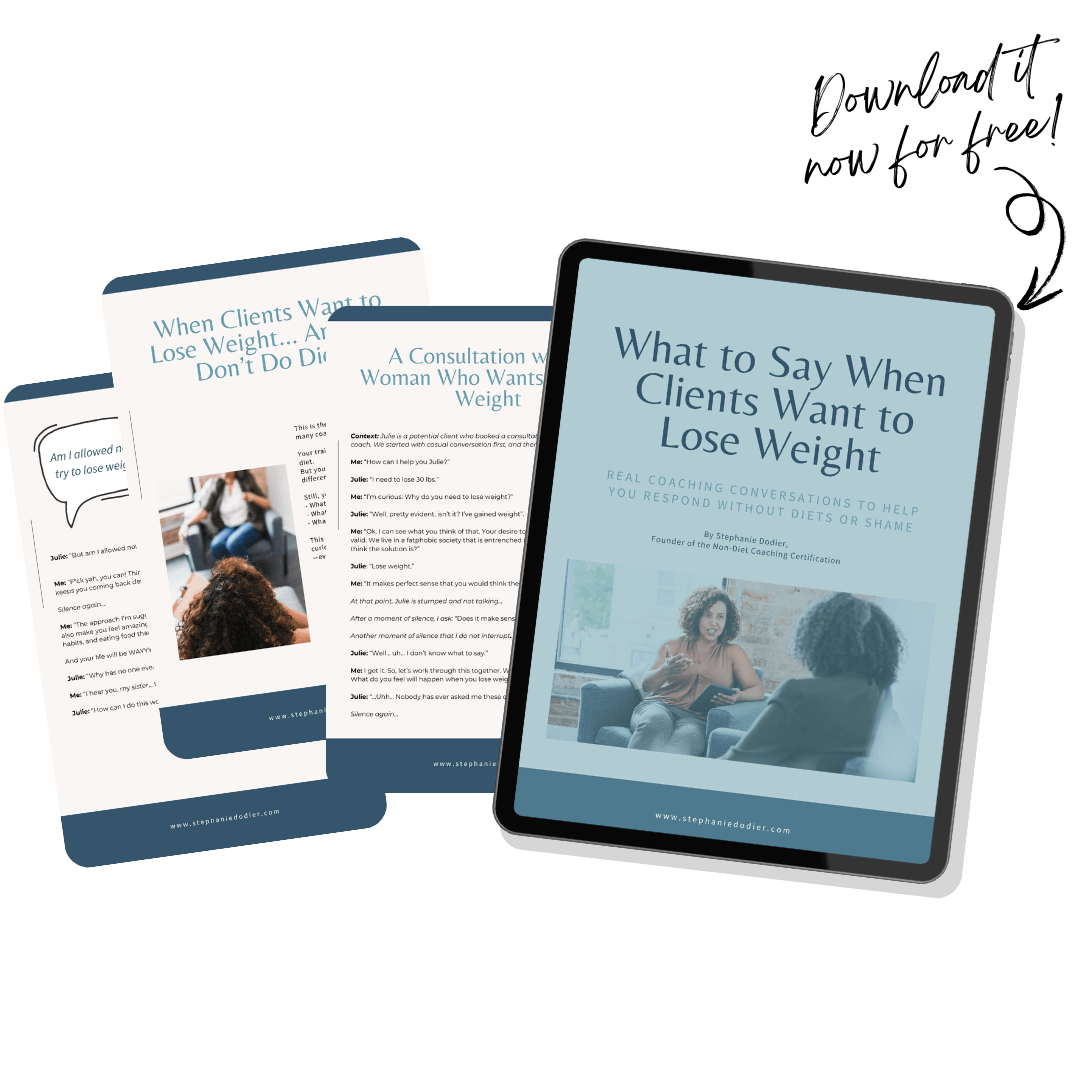

FREE GUIDE
What to say when a client want to lose weight
GET THE EXACT WORDS I USE IN REAL COACHING SESSIONS—WHEN WEIGHT LOSS COMES UP AND I’M HOLDING A WEIGHT-NEUTRAL STANCE


FREE GUIDE
What to say when a client want to lose weight
Get then exact word I use in real coaching session when weight loss comes up and I'm holding a weight-neutral stance


Welcome!
I’m Stephanie Dodier
I am a non-diet nutritionist, educator, and feminist business leader challenging everything we’ve been taught about food, health, and coaching.
I help health professionals confidently coach food and body without co-opting diet culture.
Join me in leading the health coaching revolution!
Ready? Let's do this!




